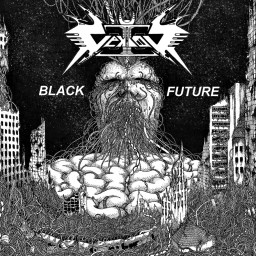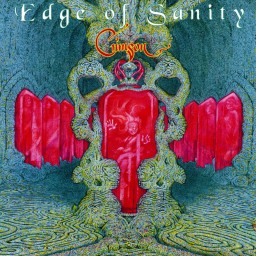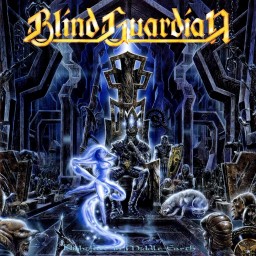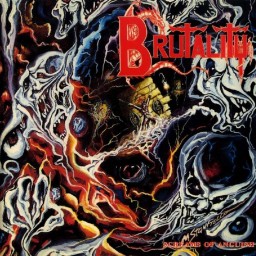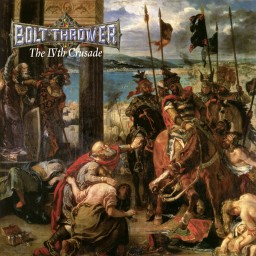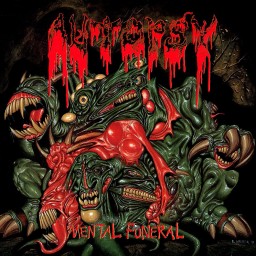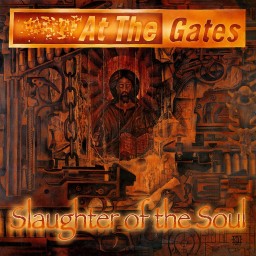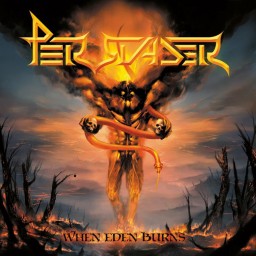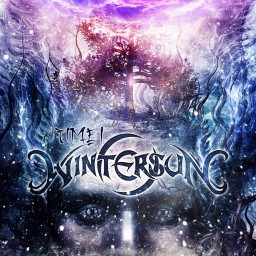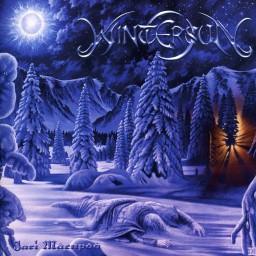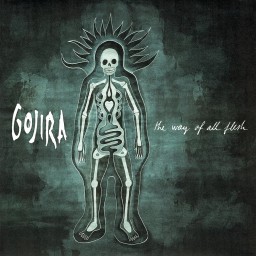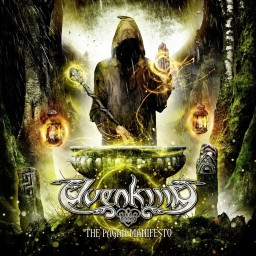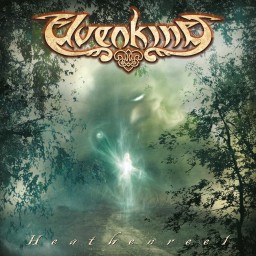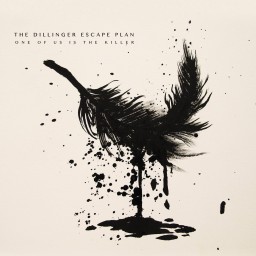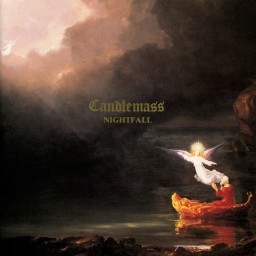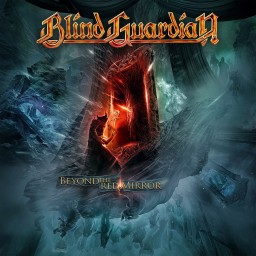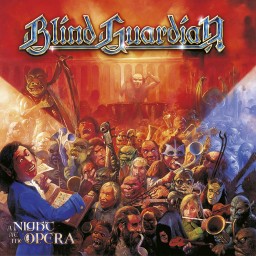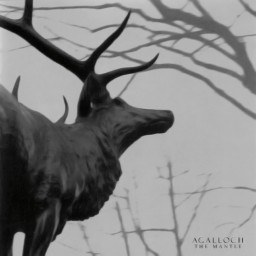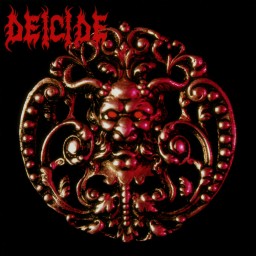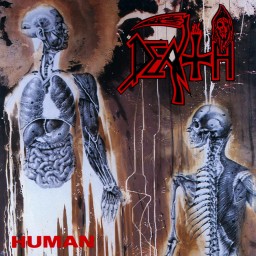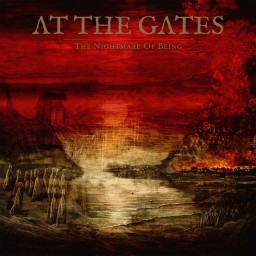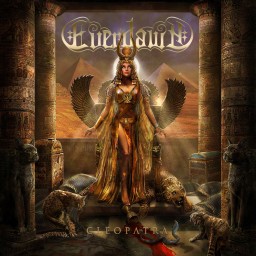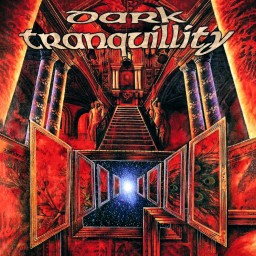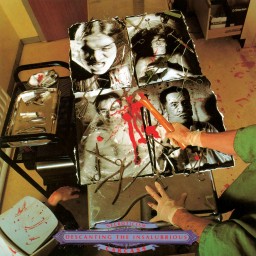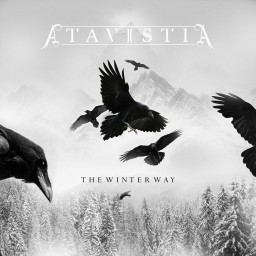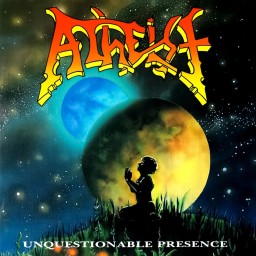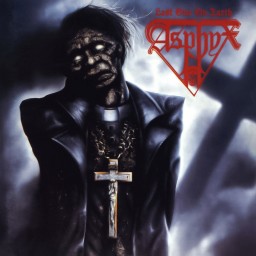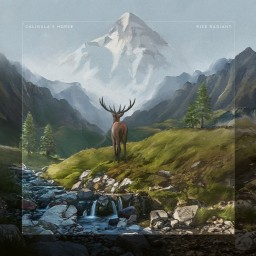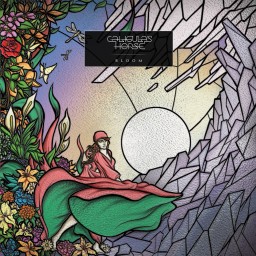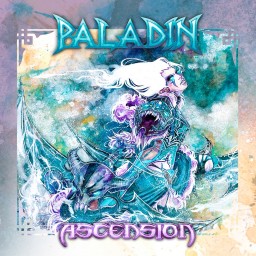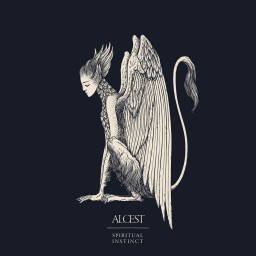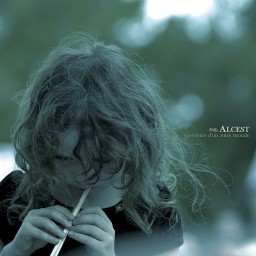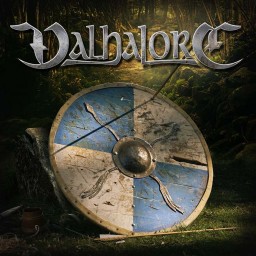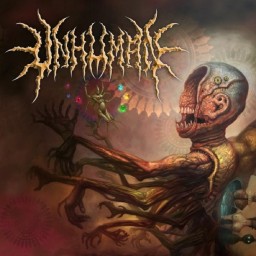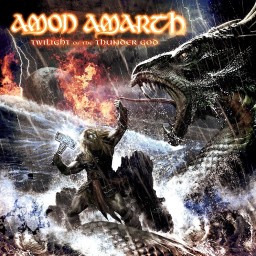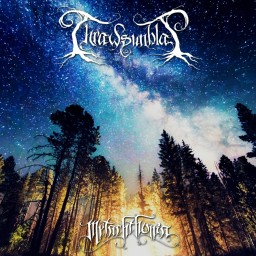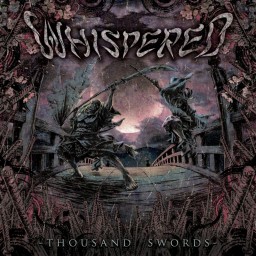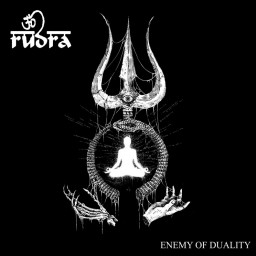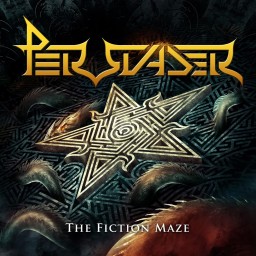illusionist's Reviews
Black Future in the Black of Night...One Soul's Solo Flight
I don't freerun too often, mostly because I'm a lazy ass who would usually rather spend an evening watching 5 episodes of Netflix, but Black Future had me going when I threw it on for the first time that one fateful February night in 2016. From the punchy groove of the opener to the building epicness of "Forests of Legend" to the sprawling transcendence of "Dark Nebula", this album - on first listen - gave me one of the most exhilarating adrenaline rushes I've ever experienced.
For ~2 hours nonstop, I stormed around Austin's urban landscape in the black of night while blasting this album's incredible energy. It almost seemed like a soundtrack custom-tailored to my experience. As I sprinted up a particularly steep hill, the crescendo of riffs in "Forests of Legend" reached its climax just before I triumphantly reached the top! The bouncy thrashing of "DNA" as I jumped stones across a river. And so on.
Going in, I was well-aware of the hype it has received from the tech/prog/thrash crowd, but it still managed to exceed my expectations. Vektor harkens to a diverse array of influences, but it is its own snarling beast. Like all genre classics, it builds upon the work of predecessors to form sounds new and original. In delightful contrast to many modern thrash bands, there is no obvious comparison. Black Future is one of those grandiose albums that is executed so beautifully that the momentum sweeps you off your feet as it goes on. Melodic, yet tenacious and primal. Not to mention the ace musicianship. Yet, a common criticism I'm seeing is that many of the songs could be shortened to even further sharpen their impact. I agree with this for the most part. This album has a bit of fat that, if trimmed, could push it to the next level. That said, I'm a hypocrite. The two 10-minute tracks are by far my favorites.
"Dark Nebula" in particular stands out as a legendary song that I will still be listening to many years from now. The traces of black metal extend from just the vocals to all the other instruments as well for this one, and the progressive composition lends itself to a degree of emotiveness I did not expect from Vektor.
All of the time spent, all of the years
All of the moments that led me to this place
What will I do now that I am here?
Riding further into the night
A search to be content with what we are
And to look and find a place among the stars
Desperately, we arrive anywhere
A place we never planned to be...
The way this part played out reminded me of something Primordial would write in one of their sorrowful, brooding hymns like "The Soul Must Sleep". One of the reasons I like to parkour/freerun at night is because there is no one else around. No cars. No noise. Just empty spaces. Eventually the exertions of my body fade into the background and my instincts take over, allowing me to drift into a sort of music-induced introspection or meditation. As "Dark Nebula" guided my journey across parking lots and bridges, those above lyrics really pierced me as I was thinking about my life. Emboldened by the swirling darkness of "Dark Nebula" and the darkness around me, I defiantly decided that I AM content with what I am.
Fuck loneliness and fuck all the people and things I've spent my life longing for. All I need is myself. Me. I. And music like Black Future that allows me to escape on my own from the unplanned places life's journey will bring me. I ran the rest of the way home with a defiant grin. Now, if you'll excuse me, I'm going to go freerun to Terminal Redux.
Genres: Progressive Metal Thrash Metal
Format: Album
Year: 2009
OPUS
A legendary achievement in progressive and melodic death metal. This album consists of just a single 40-minute song. But oh what a song it is!
Crimson is a true roller-coaster of emotions and sonic textures, with about 100 different awesome riffs stuffed in. Certainly on the meaty and riff-oriented end of the "melodeath spectrum" for much of the musical duration, with loads of atmosphere and neat details added in between. Alongside the music, a post-apocalyptic fantasy saga on the scale of epochs unfolds. In fact, it almost plays like a death metal audiobook at times, with the riff change-ups marking plot twists in the story. It helps, of course, that Dan Swäno's harsh vocals are easily understood, with some superb heartfelt cleans mixed in too.
Altogether, it's a masterpiece - a musical journey greater than the sum of its parts. The really special moments sprinkled throughout this album are among my favorites in all of metal. I won't say it's a perfect album as some of the transitions are a bit rough and a couple of the riffs are re-used a few too many times, but overall, this is an album that simply must be heard by anyone who wants to experience all that metal is capable of. I can still remember the first time I stumbled upon this gem on YouTube. I knew it was going to be an all-time favorite as soon as that very first violent riff thundered in. I pulled up the lyrics and followed along to the whole song/album in one sitting, transfixed at my desk for the duration. Still one of the most memorable musical experiences I've had to this day.
Genres: Death Metal Progressive Metal
Format: Album
Year: 1996
Ah, Nightfall in Middle-Earth. The album that was my very first taste of my favorite band.
Hansi Kursch is at the peak of his vocal powers and delivers countless amazing melodies that would make God himself weep. There are guitar solos and harmonies that can only be described as pure gold in your ears. The compositions are constantly creative, each song bringing something new to the table and surprising you in a different way. This album is all at once triumphant and tender, sorrowful and energetic, grandiose and atmospheric, majestic and jubilant... So many emotions and feelings all wrapped up into a well-narrated storyline expanding upon Tolkien's The Silmarillion. It's... it's... just so beautiful! *Sighs*
Some selected highlights:
- "Into the Storm" is a rip-roaring opener with a remarkable solo
- "Nightfall" is the concert favorite with its subdued, mournful verses that explode into the big sing-along chorus
- "The Curse of Feanor" has the best of both worlds: speedy kickass riffs and drums right alongside some of Hansi's most heart-wrenching vocals.
- "Blood Tears" is a slower song, with a somber atmosphere and dramatic flair that come together perfectly.
- "Mirror Mirror" is quite possibly the song that best exemplifies Blind Guardian. It's the complete package. Amazing riffs, amazing melodies, amazing solo, amazing lyrics. It's simply an epic composition.
- "Noldor (Dead Winter Reigns)" is THE perennially underrated Blind Guardian song and the one that perhaps best captures the spirit of Tolkien with its beautiful lyrics and powerful atmosphere of tragedy.
- "The Eldar" is a short piano ballad a la "Black Chamber" that really showcases Hansi's vocal talents. His powerfully-delivered high-octave lines at the end send shivers down the spine.
...And many more. I could go on and on describing why each song is so awesome, but I'm realizing that I cannot adequately capture with words the transcendence of the music on hand here. If you have any interest in power/progressive/speed metal, rock opera, OR fantasy... you need to experience Nightfall In Middle-Earth for yourself. If you enjoy all of these things.... oh-hoho, prepare to be spellbound!
Genres: Power Metal
Format: Album
Year: 1998
Whenever the topic of discussion is underrated bands or overlooked classics in Death Metal, Brutality is one of the first names I bring up.
However, it is not their acclaimed debut Screams of Anguish but its successor When the Sky Turns Black that has long received my adoration. In my mind, the sophomore album stands out from the crowd with its slightly unhinged vocals, alien guitar solo squeals, and a hint of Black Metal/Euro-scene influence with its inspired use of tremolo riffing and eerie interludes. While such ingredients can also be found on Screams of Anguish, they are still coagulating. Here, Brutality stand a little bit closer in line with their contemporaries in the early US scene.
This album is the more technical and "brutal" of the two albums, which will suit many listeners, but coming to it after years of loving the aforementioned qualities of When the Sky Turns Black, it does struggle to capture me in the same way in terms of songwriting and overall ambiance. That's not to say there aren't great moments. The opener "These Walls Shall Be Your Grave" is my pick of the bunch, setting the album forward with a head full of steam. The momentum created by the quickly-churning riffs in the second half of the song remind me strongly of my favorite Brutality song, "When the Sky Turns Black". In the second half of the album, the trio of tracks from "Exposed to the Elements" to "Cryptorium" also stands out as very strong. I found myself headbanging to each. Songs such as these contain a clear imprint of the Brutality identity I loved on When the Sky Turns Black -- their fluid interchanging of riffs, and wailing solos. Those particular aspects, it seems, are something the band has always performed remarkably well.
Without doubt, this is old-school Floridian Death Metal done at a very high level. If you are a fan of early Death, early Morbid Angel and the like or if you are just now getting into that sound, Screams of Anguish is certainly a worthy listen and might just become a favorite. However, if you grew up listening to those bands, checking this release out years later may not necessarily amaze you or bring anything new to the table. If that is the case, I would encourage you to also check out When the Sky Turns Black, for a version of Brutality that, a year later, is a little more refined.
7/10
Favorite track: "These Walls Shall Be Your Grave"
Genres: Death Metal
Format: Album
Year: 1993
It's not easy to immediately identify what exactly makes Bolt Thrower such a special band. On paper, they play your standard meat-and-potatoes Death Metal. Mostly mid-paced, not particularly "brutal", not technical at all. Standard growls. Standard song structures. Yet, from very early on in my metal journey, they were a band that managed to capture my attention and imagination without fail. Still today, their music holds up better to continued relistening than 95% of other Death Metal trying to be either more extreme or more intricate.
Like a master carver who can forge the most impressive of compositions with just one rudimentary tool, Bolt Thrower don't need all the bells and whistles for their craft. The magic of Bolt Thrower lies in their ability to take an admittedly orthodox template and turn it into something completely unique. Distilled through their inspiration from the human triumphs and tragedies of warfare, what would've otherwise been Death Metal-by-the-Numbers becomes something unique and alive.
The IVth Crusade, alongside ...For Victory, is perhaps the strongest example of this in Bolt Thrower's distinguished discography. The title track immediately sets the tone, with an ominous ode-like melody infused into the lead guitars at a crushingly deliberate tempo. It's strange to call Death Metal atmospheric, but that's exactly what this is. These relatively simple riffs invoke such a strong feeling in the listener... and such a precise feeling. The feeling a soldier or ancient crusader would feel, just before charging into battle. Standing atop a hill, looking down upon the lines of the enemy, knowing you will soon be locked in deadly, bloody struggle with men much like you. Kill or be killed. Unlike many Death Metal bands who revel in the gore or the combat of battle itself, Bolt Thrower instead focus on musically conveying the sheer gravity of warfare from a human perspective. It's a heavy thing - and this heaviness, and humanity, is matched in the music.
Bolt Thrower accomplish this in different ways. They accomplish it through their lyrics, for one. In addition to being "mortified by the lack of conscience" of those who "vanquish in the name of your God" on the title track, Bolt Thrower also spite mankind's constant thirst for domination throughout the ages in "Where Next To Conquer", bemoan the mutually-assured self-destruction human civilization seems doomed for on "As The World Burns", and explore other effects of warfare -- on the human psyche, technology, and on spirituality/religion. On this album especially, vocalist Karl Willetts has a huge knack for great opening lines, delivered with extremely memorably rhythm and conviction. You are a stronger man/woman than I if you can resist headbanging furiously when Willetts jumps on top off the heaviest riff on the album on "Icon", bellowing NO ESCAPE! THERE IS NO WAY OUT! ... YOU CANNOT FIND THE REAL YOOOOOUUUUU. Other examples are "Where Next To Conquer" (LOST!!! ON A VOYAGE, NO DESTINYYY!) and "Celestial Sanctuary" (As the sky turns BLACK!). These powerful Death Metal hooks, so to speak, are insanely fun and immediately reel the listener in and ensure they can't skip the track or stop the album before the end.
They also accomplish it in different ways musically. Although Bolt Thrower aren't "melodic" in the traditional sense, they do an excellent job of utilizing brooding clean guitar harmonies/disharmonies to create that foreboding pre- or post-battle atmosphere, as touched upon with the title track. This allows the pummeling death metal riffs, representing the destruction of battle itself, to have so much more impact when they do take control. In this way, Bolt Thrower are excellent musical storytellers, weaving together scenes of "action" and scenes of dialogue or reflection. But can we talk a little bit more about those riffs? None of this works if Gavin Ward and Barry Thomson can't write appropriately monstrous and memorable riffs. As with any Death Metal album, the there is some variance there, with some songs offering superior riffs to others, but overall the quality is extremely high. There are 4-5 songs on this album with main riffs that pulverize what most of Bolt Thrower's peers are ever able to write in their whole careers.
When you tie together the excellent construction of theme (outro "Through the Ages" underscoring that this inescapable violent nature of humanity that Bolt Thrower depict exists past, present and future), the memorable lyrics, the tasteful simplicity and effectiveness of song structure, and the massive-sounding guitar, drums AND vocal performances, you have a truly winning experience of pure Death Metal. Although there are no unusual eye-catching ingredients on paper, as usual, Bolt Thrower are a band that comes together to create something much greater than the sum of their parts.
Strong 4
Favorite Tracks: The IVth Crusade, Icon, Embers, Where Next to Conquer, Celestial Sanctuary
Genres: Death Metal
Format: Album
Year: 1992
Mental Funeral is one of those iconic albums in the canon that any burgeoning death metal fan will quickly learn about. It's an impossible album to forget once you've been exposed to it in one form or another.
Whether because of the monstrous green multiheaded creature (that cover was seared into my memory before I ever check out an Autopsy song) or because of the filthy macabre of the general sound, you will remember it.
Autopsy made a big impression with this release, pushing death metal to new extremes. They weren't aiming for new extremes of speed or technicality or blunt brutality like many of their peers of the era though. Instead, Autopsy expanded our concept of how sick and nasty and, well, "fleshcrawly" death metal could sound. For this reason, they are often considered progenitors of the Death/Doom hybrid subgenre and this seminal release of theirs has stood the test of time as a major landmark and classic.
How does it hold up as a pure listening experience in today's context though?
Very well! Thirty years later, and I daresay few bands have matched the feel Autopsy create on this album. The production remains perfect. It's clear and balanced, every instrument powerful. The guitar tones are dirty, and Chris Reifert's drums somehow sound demented in their own right, like the hits simply must be on skulls and human skin rawhide drums. When the two instruments rein in the chaos and synchronize into one of their deliberate riffy grooves, it sound like demons are pounding their staffs on the ground as you slowly march into hell (see: "Torn From the Womb").
Like any album whose main appeal is its texture and sheer visceral sound, Mental Funeral has some songs that create this effect better than others and a few expendable tracks. Fortunately, unlike many bands in this subgenre, Autopsy have the songwriting chops to create just enough diversity between the songs to prevent the album becoming one big blur of sameness. For example, "Dead" is unique in that it has spoken vocals and is centered around a repeated clean guitar lead (still an evil-sounding one, mind you) rather than dirty riffs, and "In the Grip of Winter" has that funky off-kilter riff and doomy section. It would have made a much stronger opening than "Twisted Mass of Burnt Decay", which is one of the more forgettable tracks.
TL;DR - Mental Funeral is a step or two below the ultimate masterpieces in death metal and a bit one-dimensional, but it is always a fun listen that doesn't overstay its welcome. It's dark and gruesome and it revels in the fact for its half-hour duration, with plenty of memorable dirty riffs and awesome-sounding drums. Should be part of every self-proclaimed death metal fan's collection.
Favorite Songs - In the Grip of Winter, Torn From the Womb, Dead
Genres: Death Metal
Format: Album
Year: 1991
From the moment the guitars come crashing in on "Blinded By Fear", At the Gates are on a mission to make two worlds collide. The darkness and aggression of underground death and thrash metal (unrelenting fury and speed)..... and the structure of standard rock/punk music (short, melodic songs built around hooks). Astonishingly, the Swedes managed to mold these constituent elements together so well that it sounded like something completely new itself.
As with most innovators, they inspired many imitators who tried to emulate the formula (looking at you, American metalcore scene) with this album. But, to this day, I'm not sure I've heard another work that is as catchy - yet also as thunderously heavy and seething with anger - as Slaughter of the Soul. It's amazing to hear the contrast. All of the songs are only 2 or 3-something minutes in length, and they just keep hitting - one after the other - of precise, catchy as hell, yet sinister, riffs, leads and delightfully memorable scream-along vocal refrains. Are you even a metalhead if you haven't screamed "THE FACE OF ALL YOUR FEEEAAARS!" or "SICK AND NUMB, BY FEAR I FALL!" or "I FEEL MY SOUL GO COOOLD!"??? In this way, it feels like a pop album because the songs are all so short, refined and catchy. But it's laid on top of a foundation of Anders Björler's guitar melodies, often tinged with haunting notes of sorrow and despair, which create a spine-chilling contrast with Tomas Lindberg's vocals, which are pure fire-spitting fury. There's no room for other emotions than these. It's pure adrenaline, rocket-fuel for catharsis via mosh pit.
Thus, I suppose Slaughter of the Soul can be seen as Melodic Death Metal's Reign In Blood. It is an album with a singular mentality and compact songs that are criticized as "repetitive" or "filler" by people who just aren't as impacted by the visceral feeling unique to the album. Personally, I love both. I also love At the Gates' earlier work, particularly The Red In The Sky Is Ours, which is very different in its more unpolished, artsy and avant-garde approach to Death Metal, but you almost have to view this At the Gates as a completely different band from that At the Gates. Don't ignore this album because of any elitists who tell you that it's a sold-out or dumbed-down version of At the Gates. The band never sounded tighter or more aggressive than they do here, and simplifying their already-stellar songwriting down to only the most impactful components made for a historic and memorable album that will never be replicated. Strong 9.
Favorite songs: Blinded By Fear, Slaughter of the Soul, Cold, Under a Serpent Sun, Unto Others
Genres: Death Metal
Format: Album
Year: 1995
Uniformly excellent material from one of the most powerful-sounding power metal bands. They really do put the 'Power' in 'Power Metal'.
On When Eden Burns, Persuader have traded a bit of their raw aggression for greater emphasis on streamlined songwriting, yet somehow also sound meaner and more "evil" than before. The dark lyrics to songs like "Twisted Eyes" and "Judas Immortal" help with that. Persuader is isn't your stereotypical sing-songy power metal act. Not at all. These guys are seething at Christianity and the folly of man. They pair it with a distinct thrash metal influence and a new tasty crunch to the guitar sound that helps differentiate them even further along those lines. But Persuader's biggest strength is undoubtedly their vocalist: Jens Carlsson. He has a distinctive raspy tone to his voice that can send shivers down your spine when he pushes it into the higher registers, and consistently combines it with ungodly-addictive choruses that stick in your brain.
All of this comes together to create a lethal double-sided sword of anthemic melody and sinister atmosphere.
The highlight of the album is "Judas Immortal", so don't quit listening until you get to that song. Complete with an acoustic section, an excellent solo and a spine-tingling outro, this song is truly an epic that any power metal fan will love. However, just about all of the songs are catchy and brimming with energy and conviction. Highly recommended for any metal fan.
Genres: Power Metal
Format: Album
Year: 2006
"Sons", "Land", and "Time" are all top-tier epics worthy of a perfect 5-star score like I gave the debut. These songs are, once again, masterstrokes from Jari Maenpaa & Co.
Unfortunately, I can't in good conscience give a 5 to an "album" with only three real songs and some mediocre instrumental interludes as filler. There is true greatness here - I just need more of it, and packaged better.
And so, the wait for Time II continues. How many more crowdfunding packages stand between us and the full realization of Maenpaa's prodigious potential as a Metal composer? However many it is, I'm willing to do my part. Until then, I'll keep singing "Land of Snow and Sorow" in the shower.
Genres: Symphonic Metal
Format: Album
Year: 2012
Here, Jari Maenpaa has perfected aspects of multiple metal subgenres (Folk, Black, Power, Melodic Death) and fused them into one totally unique opus. Frigid, majestic soundscapes with a warm, beating heart at the core. Every song is a spine-chilling masterpiece.
Genres: Death Metal Power Metal
Format: Album
Year: 2004
More advanced songwriting than The Link but more direct and in-your-face than From Mars To Sirius, The Way of All Flesh achieves what might be the perfectly fine-tuned balance of the Gojira sound.
Most of the songs here are truly great... crunching, grooving and churning underfoot with unstoppable metallic force, yet also rippling with an addictive sheen of primal melody... from the tremolo harmonies of "Esoteric Surgery" to the Joe Duplantier's hopeless wails on "A Sight To Behold". A couple mediocre tracks in the middle ("Adoration For None" in particular - thanks Blythey) hold it back from being the immersive opus its predecessor was, but there's no denying that a lot of fat has been trimmed from FMTS and that The Way of All Flesh has benefited as a result. The focus on straightforward, to-the-point metal songs that rip hard suits Gojira's burgeoning strength as catchy metal songwriters. Yet it's very clearly the same band that wrote FMTS and still falls under the umbrella of "Progressive Death Metal", for lack of a better term. Gojira sound like no one else in the game and that is their strongest asset. Artistic, refined and insanely re-playable with passionate lyrics, this is a release that keeps existing genres fans and newcomers alike intrigued!
Highlights: Toxic Garbage Island (best riff), A Sight To Behold (an arresting ethos on human destruction), The Art of Dying (dem drums), Esoteric Surgery (catchy), Vacuity (catchier)
Genres: Progressive Metal
Format: Album
Year: 2008
The Italian veterans blast back to the forefront of the power and folk metal scenes with a triumphant return to form.
The Pagan Manifesto leaves me with the same jubilant, fulfilled satisfaction as Heathenreel 13 years before - high praise! There is not a single weak track to be found here. Each one is overflowing with that pure folksy spirit and carefree heart that Elvenking capture when they're at their best. There are countless infectious melodies (including a cameo of the guitar melody from longtime fan-favorite "White Willow" on track 2) throughout this thing, making it one of the biggest earworms of the year. Indeed, after only two full listens, I could already recite the chorus to almost every track at the top of my lungs.
The Pagan Manifesto is not for everyone, admittedly, as the cheese factor is quite high. It's a fun-oriented album that doesn't take itself too seriously. It's meant to be sung out loud alongside compatriots or howled at the moon on a pleasant evening walk or jammed to in the middle of a festival crowd. But if you have ever enjoyed anything by Elvenking, do yourself a favor and get this album.
From adventurous epics like "King of the Elves" and "Witches Gather" (the former giving the classic "Seasonspeech" a run for its money) to the straightforward unbridled energy of "Elvenlegions" and "Pagan Revolution" to the somber emotion of ballads "Towards the Shores" and "Twilight of Magic", this is one of the most consistent and memorable folk/power metal fusion albums I've ever heard. Yes, ever.
Genres: Folk Metal Power Metal
Format: Album
Year: 2014
Six songs (The Regality Dance, White Willow, Pagan Purity, Skywards, Oakenshield and Seasonspeech) are among the best I've ever heard in Folk Metal.
If the other songs were as amazing as the six above, Heathenreel would be one of the easiest 5-stars I've ever given. But there are a few skippable tracks, which forces me to shave a half-star off. Even though I really don't want to because of how deeeep my love runs for the likes of "The Regality Dance" and "Seasonspeech".
Now, ehen I first heard Elvenking's vocalist, I wasn't sure if I liked his voice. At first, he almost sounded like a pop-punk singer. However, you quickly get used to it and come to love it. I now cannot imagine the band any other way and consider his voice one that truly captures the pagan spirit because when he sings you can truly tell how much passion and love he has for each word and note in the music. His voice, and the rest of the band's performances, sound so carefree and joyous, as if they're playing and skipping along in a vast green meadow.
Genres: Folk Metal Power Metal
Format: Album
Year: 2001
One of the top albums of 2013 and The Dillinger Escape Plan's best album to date. They're catchier and more fun than ever without relinquishing their trademarked abrasiveness and mind-blowing technicality. The first four tracks are instant classics on first listen. Like, HOLY SHIT. Their energy flows into each other so well. Even still, when I play this album it becomes difficult to restrain myself from jumping around the room and smashing things while yelling the lyrics.
YOU SMEAR YOUR FILTH ACROSS THE WORLD!
Awesomely Amazing tracks: 1, 2, 3, 4, 7
Very very good tracks: 5, 6, 10, 11
Just alright tracks: 8, 9
Genres: Metalcore
Format: Album
Year: 2013
Doom Metal doesn't get any better
Candlemass' sophomore effort Nightfall is very close to being a perfect album. Though there are only six full songs, each is of the absolute highest quality you can find in the Metal genre. Soaring tragic-operatic vocals, riffs of pure theatrical evil, and climatic solos galore. The absolutely massive entrance of "The Well of Souls" after the build-up of "Gothic Stone" should tell you all you need to know. That moment sets the tone and Nightfall never relinquishes its powerful, ominous grip.
The aforementioned "Well of Souls" is perhaps the single best song of this band's career in this listener's opinion, but "Samarithan" and "Bewitched" are also masterpieces of the Doom genre that will never ever be matched. The other three tracks aren't far behind. Candlemass stick to their sound, but it's truly their own (they're the pioneers of Epic Doom) and they do it so fucking well. You can tell they are energized by the (at the time) new presence of Messiah Marcolin's pipes, which are an obvious highlight. The album doesn't get repetitive (a common problem in Doom) because the songs all have their own fascinating lyrical story that perfectly match their destructive or mournful riffs. Some gloomy instrumental interludes are also mixed in throughout to amplify the atmosphere to heights never reached on the debut. This is an - no, THE - essential of Doom. If you have any interest in the genre at all, you need to listen to this seminal release.
I am the master of the ancient etude
I'll play for your joy, for your soul, for your doom
My fingers, they dance upon the strings like fire
Weaving a spell of my burning desiiiiire
Genres: Doom Metal
Format: Album
Year: 1987
One thing I love about Blind Guardian is that they never make the same album twice. Each release has a slightly different feel to it , while retaining the same core identity. On Beyond The Red Mirror, the differentiation is a new style of orchestration and choir arrangements. They lend certain songs on this album a certain grandiose and lovably pompous air. In that way, I would say this album is stylistically most similar to A Night At The Opera. Since that was a near-perfect album to me, I have no complaints, though significant traces can be found from all three of their 2000s releases. There is certainly a lot to like here for anyone who has enjoyed the last three Blind Guardian releases.
- "The Ninth Wave" is an unorthodox symphonic power metal song, and an intriguing opener. The intro choir is a nice way to set up the album, and I was also surprised to find myself enjoying the electronic touches in this song. It doesn't hook you immediately like "Sacred World" did and is more of a slow-grower. But once the chorus and that twin guitar solo section hit you, they will be echoing in your head for days. 8.5/10
- "Twilight Of The Gods" is rather standard Blind Guardian affair, but that's a compliment! It's a fairly simple song, which is why it was the lead single, but it's catchy and will be a hell of a lot of fun to sing along to at the shows. 8.5/10
- "Prophecies" might just be my pick for favorite song on the album. The lyrics are poignant and relatable, with perhaps the catchiest chorus on the album (Shadows will be rising soon!!). The melodies in the last two stanzas are amazing ("break the seal, find the red door" and "the eternal, the infernal, will we ever see the light again?"). Infectious. 10/10
- "At the Edge of Time" wins the award for best chorus on the album. Absolutely magnificent, uplifting and, yes, EPIC. It makes me feel like I'm soaring through the clouds. Hansi really shines on this track, as does the orchestration. 9.5/10
- "Ashes of Eternity" is probably the heaviest song on the album, with some headbangable riffs and some good screams from Hansi. It's the least memorable song on the album, but it's certainly a decent attempt at a classic speedy Blind Guardian song. I just don't think the vocal melodies mesh well with the music. 6/10
- "Distant Memories" is a bonus track, but I have no idea why it wasn't included on the main release. It is utterly beautiful. Transcendent. Probably in the top three songs from this album. It is a ballad that sees Hansi Kursch deliver one of his most tender, heartfelt performances ever. I love the sorrowful, regretful mood of this song and how it connects to the overarching story. Towards the end, when Hansi shifts into the climax melody ("Out of the dark, into the grey...") I get chills and can't help but sing along. We will salute you... 9.5/10
- "Holy Grail" is a song that would've been right at home on Imaginations From The Other Side. No orchestra, and some riffs from Olbrich & Co. that absolutely shred. Kursch is great as usual - sounding like he's a long-haired 20-something again. The chorus reminds me a bit of the intro to "The Quest For Tanelorn" and the chorus of "Journey Through The Dark", which are very positive comparisons. A highlight, especially for those who prefer the classic Blind Guardian sound. 8/10
- "The Throne" is probably the most bombastic song on the album, channeling the spirit of "And Then There Was Silence" with its constant barrage of vocal melodies and an extended guitar solo. The guitars, symphonies and vocals all have several memorable parts and play off each other beautifully. So so epic. It has grown on me a lot since I first published this review and is one of the true highlights now. Weeeee will NOT surrender! 10/10
- "Sacred Mind" is quite unique, probably the proggiest song on the album. There's a very neat guitar line that ripples under the chorus. The song builds up momentum very effectively from the brooding intro crescendos into the aggressive verses before finally arriving at the soaring, mysterious chorus. I personally find the chorus a tad irritating because the word "Xanadu" is drawn out and repeated like four times, but that's a minor complaint. I heartily enjoy the other parts of the song. 8.5/10
- "Miracle Machine" is the 2015 equivalent of "Black Chamber". Hansi Kursch once again lets his idolization of Queen shine through. It's basically a capella, with Kursch's clean vocal lines being the sole focus with some soft, happy-sounding piano in the background. I personally find this song a little cheesy. It doesn't have the darkness or emotional resonance of "Black Chamber". But it's well-performed and still enjoyable. It's a much-needed respite before the lengthy closer. 7/10
- "Grand Parade" lives up to the Blind Guardian legacy of epic album closers (WoT, ATTWS, And The Story Ends, SFB, Last Candle, etc etc etc). Brilliance sustained across the entire duration. 10/10
Overall, Beyond The Red Mirror is certainly an album that is worthy of the Blind Guardian legacy. It is not a perfect album (the muddled production threatens to prevent some songs from reaching their full potential), nor is it their very very best, but I do love most of the songs, and it will join my regular rotation of BG favorites. That's all I can ask for. Thank you, Bards, for continuing to work hard to bring us passionate, inspiring music.
Genres: Power Metal Symphonic Metal
Format: Album
Year: 2015
This is perhaps Guardian at their most progressive, ambitious and passionate. Tons of studio vocal layering and slightly outdated 90s-sounding choirs and orchestrations give the impression that these songs are, in fact, being performed by the motley group of PC Fantasy RPG musicians on the cover. Some may decry this album for this bombastic shift and pushing father from the band's speed metal roots (which I too love), but these fools are missing out on a brilliant display of diverse and heartfelt musicianship that reveals itself after a few listens to digest.
"And Then There Was Silence" merits special mention as one of the most incredible songs of all time. Over the duration of fourteen minutes, it constantly bombards you with epic vocal melody after epic vocal melody as it tells the tale of the Fall of Troy - horse statue and all. From moments of sorrow ("at the moment of death I will smile"), to moments of love/lust ("she's like the suuunlight, outshines the moooon at night") and even moments of pure circle-dancing bliss ("la la lala la lala la lala"), this song has it all.
The rest of A Night at the Opera is exquisite as well. "Precious Jerusalem" and "Battlefield" with their frantic choirs and soaring choruses, are instant classics. "The Maiden and the Minstrel Knight" is up there with "The Bard's Song" and "A Past and Future Secret" in the pantheon of the best power metal ballads. "The Soulforged" and "Punishment Divine" are two songs more in the ilk of classic heavier Blind Guardian and deserve to be mentioned among the band's best. Even the more pompous and over-the-top symphonic numbers like "Under The Ice" and "Wait For An Answer" eventually grow on you and become favorites.
Genres: Power Metal
Format: Album
Year: 2002
A benchmark of twentieth century ART
The Mantle blends traces of black metal, acoustic folk, and post-rock in a way unlike anything else I have heard or ever will hear again. Bergtatt: Et eeventyr i 5 capitler, an album I adore equally, is the closest possible comparison, but Agalloch's crown jewel shines a different hue than Ulver's. They build atmosphere the most effective way in metal: by utilizing each instrument to reflect their emotions (no immersive synths or try-hard 'concepts' needed). For a work with such minimalist tendencies, the atmosphere is crushingly thick. This album is a journey front-to-back, constantly weaving a texture so unique yet so tangible that you have no choice but to drown in it every time it graces your ears. It is cold and frostbitten, yet with a core of warmth to it deep inside...like a dying fire on a winter night. You will feel like a solitary wanderer timelessly traversing desolate, snowy woodlands like the elk on the front cover. At other times, you will be empowered by waves of stunningly gorgeous soundscapes. There is a mysterious allure that resides in Agalloch’s second album. It is difficult to grasp with words, but whatever it is...it's special. It is albums like this that make music worth exploring, sharing and reviewing. These songs will be the soundtrack to my melancholy winter days for years to come.
Genres: Folk Metal Post-Metal
Format: Album
Year: 2002
I was not alive back in 1990, but I can imagine how - at the time - this release would have immediately made Deicide a household name in Death Metal circles by virtue of just how demonic it sounded. As if the disgraced angel himself wanted to make a record to capture his wrath at the injustice of God. Indeed, Deicide isn't just evil-sounding. Death Metal had accomplished that before. It's evil-sounding and angry as hell. Pissed off with a personality. Most of that comes down to Glen Benton's distinctive barked vocals. While Benton on this record overuses vocal manipulation effects that sound cheap and dated by today's standards to achieve this, it doesn't take away too much from the infernal feeling evoked across the duration. In my opinion, Benton and Deicide would go on to write more memorable songs and more enjoyable overall album experiences, but their debut nonetheless finds them immediately hitting the mark of the sound that would make them a unique act in Death Metal for years to come. In fact, it might just be their most visceral and potent dose.
If you already like Deicide and haven't heard this, it's definitely one you should check out. While some tracks blur together, others like "Deicide" and "Dead by Dawn" stand the test of time as surprisingly catchy genre classics, hinting at the knack for catchy-yet-evil songs they would refine further as the decade wore on. If you still haven't gotten into Deicide, this is as worthy of a place to start as any of their 90s albums.
Genres: Death Metal
Format: Album
Year: 1990
Human is not necessarily my favorite Death album, but I think it was the most influential one in the formative years of my metal journey. Hearing the lyrics and instrumental intro of "Lack of Comprehension" for the first time expanded my perception of what non-Melodeath "Death Metal" was capable of as an art form. Hell, my first username on RateYourMusic was cosmic_ocean because "Cosmic Sea" was taken.
In parallel, although Human is not necessarily the best Death album outright (although it certainly has an argument), I think it likewise was the most important one for the band and for the genre at large. It was a transition album for the band, the crossroads between the more straightforward "brutal" stylings of earlier albums and the buffets of instrumental showmanship and progressive songwriting that later albums would become. The arrival of god-tier players Steve DiGiorgio on bass and Sean Reinert on drums allowed band leader Chuck Schuldiner to tap into new creative possibilities, while still viewing things squarely through a primarily Death Metal lens at this time (later albums would lean more towards Prog Metal with death metal vocals). The results accelerated every direction that the genre would spiral off in in the coming years... from Brutal Death to Techdeath to Melodeath. In particular, Human would inspire decades of Techdeath shredders.
For many, calling Human a "transition album" doesn't quite do it justice though. Indeed, the quality is so damn high (half the songs are bona-fide Death Metal classics) that it feels an affront to imply Human was simply means-to-ends in the development of the band. These people would justifiably argue that Human was also a "Best of Both Worlds" album... the precise moment in time where the stars aligned and Death found the perfect balance between their earlier and later sounds. From this perspective, Death here had sufficiently leveled up their instrumental, songwriting and production capabilities but hadn't yet lost touch with their inclination for brutality, creating a perfect storm that Death would never recapture.
Do I agree with this perspective? Well, listening to the album as I write this... it's hard not to. I more often opt for Symbolic for its flow and sheer front-to-back listenability, but Human slaps in a completely different way. The first three songs are a tour-de-force of technical yet gut-punchingly heavy yet undeniably catchy Death Metal (being all of three of these at once is NOT EASY)... and then by the time you get to that monstrous middle section of "See Through Dreams", you can no longer doubt you're listening to one of the most brilliant works in the history of the genre.
CLOSE YOUR EYES..... AND IMAGINE TO BE WITHOUT..... WHAT WE TAKE FOR GRANTED..... EVERY TIME...... WE OPEN OUR..... EEEEEEYYYYYEEEEESSSS
Now, for me, that moment is where the album peaks, so to speak. Whenever I spin Human, I typically quit after Track 6. If you refer to Paragraph 1, I obviously thought the song title and bass solo of "Cosmic Sea" were cool as a teenager, but the instrumental interlude does disrupt the unstoppable momentum the album had built up to that point. And then closing track "Vacant Planets" is the only one here that just never really gripped me. It has a cool spacey riff, but represents a disappointing conclusion for an album that was so immense through six tracks.
So is Human an immaculate masterpiece that will forever sit atop the Death Metal pyramid? Or, in retrospect, was Human more of an influential stepping stone to greater works? As always, the truth is somewhere in the middle...
One thing is for sure though. It's damn close to the top of the pyramid.
Genres: Death Metal
Format: Album
Year: 1991
I love that At the Gates tried to push themselves here and make a stylistic leap comparable to the ones between some of their 90s albums. They definitely succeeded in breaking out of the formula of the last two records, which I didn't expect them to do at this point of their career.
The progressive elements and diverse song structures are exciting and make this a highly entertaining listen. For example, the saxophone solo on "Garden of Cyrus", the groovy drumbeat that takes center stage on "Cosmic Pessimism", and some of the brief subdued strings and jazz guitar moments throughout that allow the Melodeath riffs to breathe. I love all of this.
The drawback is that only a few of the tracks fully cross the threshold from intriguing ideas to being comprehensively exciting songs. For all of the admirable experimentation on this record, the most striking and memorable song is probably "The Paradox", the most by-the-numbers At the Gates track on here.
This record may continue to grow on me as I digest, but at the moment, I can't give it a further endorsement than "a worthwhile and interesting listen for those who have followed At the Gates' evolution up to this point".
Genres: Death Metal
Format: Album
Year: 2021
The Sun is shining over my Alexandria... Oh Cleopatra, You'll Live Forever
Symphonic Metal with operatic female vocals has become a popular and increasingly crowded niche in the last decade. It has also never really been my cup of tea. When I heard about this new Everdawn project, however, with names such as Dan Swanö (Edge of Sanity), Thomas Vikström (Therion), and Mike LePond (Symphony X) involved - and a cover featuring one of my favorite historical figures - I was intrigued enough to give Cleopatra a shot.
While I'm no expert in this sub-sub-genre, it's hard for me to image modern female-fronted Symphonic Metal getting much better. The immediate memorability and quality of this release outshines anything I've heard from the likes of Xandria, aside from maybe an Epica song here or there. Catchy anthemic choruses, impeccably sung with operatic highs and sultry lows... customarily wonderful Swanö production, all instruments given depth and interesting parts to shine... Especially the guitars. This is NOT one of those symphonic/operatic albums where the "metal" instrumentation is neutered.
While the brilliant singer, Alina Gavrilenko, brings the songs to life, what truly makes Everdawn stand out is the songwriting and variation within and between songs. Albums with operatic vocals can get monotonous, but this one never really does! The first half of the album contains the best material, rolling from strength to strength with the infectiously fun and eastern-inflected "Stranded In Bangalore", the delightful male-female duet ballad "Your Majesty Sadness", and the powerful, catchy and mysterious chorus of "Infinity Divine".
By far my favorite song here, however, is the title track "Cleopatra" - a true 5/5 keeper. After initially grabbing your attention with some speedy riffs/keys and an epic Power Metal chorus, the song then slows you down for a guitar solo dripping with emotion. The way the song then unfolds, building the energy back up with the guitars and crescendoing into a new climax vocal part, is executed perfectly... a treat for the ears no matter how many times you listen to it. You'll be singing along to the ending repeating lines with a big 'ole grin on your face. OH CLEOPATRAAA...
The second half of the album does see the level drop a bit, but that's only because the level of the first five or six tracks was so high. The remaining songs are all at least "good", and are broken up nicely by the brief but heavy instrumental "Toledo 712 AD".
Altogether, this is an exemplary debut out of New Jersey and an early highlight of 2021!
Genres: Symphonic Metal
Format: Album
Year: 2021
The first classic album by probably the first Melodic Death Metal band, The Gallery's release in 1995 marked the coming-of-age of a sound that had been brewing in the Swedish underground since the early 90s.
A flurry of demos and EPs from bands such as Eucharist, At the Gates, and Unanimated, in addition to Dark Tranquillity, had established a primordial version of the "Gothenburg sound"... taking the raw tremolo riff-fest of Death Metal and infusing just a dash of melody and dynamic variation, with eyes towards gothic and philosophical themes rather than horror. Many bands have since achieved success by taking that formula in various directions in the decades since, but in my opinion this release marked the moment Melodic Death Metal truly became something separate and distinct.
Building upon influences hinted at in their earlier works, Dark Tranquillity intelligently took everything differentiating them from standard Death Metal, and took them even further. The compositions became even more progressive and ambitious in every way. More intricate and technical in the fast guitar-driven parts, juxtaposed against increased presence of simple piano, acoustic guitar, tasteful bass. More emotional, varied and understandable vocal delivery to complement the more cryptic and, frankly, epic lyrics. More complex. More melodic. And more intellectual than anything this burgeoning scene had yet produced. In short, Dark Tranquillity finally became everything that the extremity-focused Death Metal of this era wasn't. Yet, somehow, it was still sonically "Death Metal" at its bleeding heart.
People rapidly caught on to the appeal of this juxtaposition. Remarkably, despite the explosive proliferation of the Gothenburg sound and Melodic Death Metal as a whole in the decades since, The Gallery remains notable not only for its pioneering influence but also for its sheer musical quality. Still to this day, The Gallery remains one of the gold-standards and essential listens of Extreme, Dark, and Melodic Metal alike.
Now, it's not quite a perfect album in my view, at least not from a track-by-track perspective, which is how I rate albums. Although every song is very enjoyable and captures that early-DT splendor, only about half of them ever caught on with me as regular listens in my rotation. Those songs, however (see below), are all-time favorites that I will listen to 'til I die. I just fucking love the band's sound at this moment in time and it flows so well and consistently across the album. There's a certain adventurous charm... a certain youthful passion... an emotional gravity to these songs that would never quite return in the same way after The Mind's I or Projector as the band aged and modernized. This isn't a shot at Dark Tranquillity's latter discography, which I enjoy, but they were just on something different in the 90s.
I'm just thankful I live in a universe where Mikael Stanne joined up with these guys and recorded this treat for the years. His pained, dramatic vocals and poetic lyrics are just so perfect for the sombre, bittersweet melodies Dark Tranquillity specialize in. This, right here, is the epitome of what I like to call "Prime MeloDeath".
Essentrial Tracks: Punish My Heaven, Silence and the Firmament Withdrew, Edenspring, The Gallery, Lethe
Genres: Death Metal
Format: Album
Year: 1995
The ultimate bridge between the filthy goregrind of Symphonies of Sickness and the razor-sharp Melodic Death Metal of Heartwork, 1991 landmark Necroticism is an unparalleled album in these genres, melding Carcass' two sides with bloody aptitude and surgical precision.
Jeff Walker's raspy punctured-lung growls, mortician's vocabulary, and disturbing spoken-word intros maintain the familiar air of demented bloodlust and organic decay from previous records, though there is also significant and noticeable evolution in the band's due to Bill Steer's increasing sophistication as a guitarist and songwriter. While not all the way over the fence into Melodic Death Metal yet, there is undeniably a potent infusion of dynamics and melody - lifeblood into the old Carcass skeleton - primarily in the the guitar work.
This is still a Death/Grind album at its beating heart, but medical signs of the coming transformation are already plainly visible. Just look at the opening track "Inpropagation". It has Carcass' frantic grindy sections and grisly subject matter ("Deteriorated flesh used as top-soil, to replenish and nourish seed"), but the song is multidimensional in a way Carcass had not previously been, with brief slower phrases and melodic guitar leads spliced in to increase the impact of the heavier riffs when they re-enter ("I PROPAGATE, DUST IN THE GRATE!").
This combination works to devastating effect throughout the album. For example, the incredible guitar soloing at the beginning of "Pedigree Butchery" and the end of "Symposium of Sickness" is extremely melodic, played with a level of feel and sensibility that feels more characteristic of progressive or neo-classical metal than Deathgrind. But these moments never overstay their welcome. You never forget on this album that you are still listening to Carcass, the legendary Gore/Deathgrind innovators. Michael Amott and Bill Steer rattle off sickeningly heavy riffs one after the other, just as fast as Jeff Walker can rattle off esoteric medical terminology. Some riffs mid-paced and churning, others nimble and punchy - often in quick succession. Some of them are really unique-sounding, like string-bending ones at the end of "Forensic Clinicism" (you'll know which one I mean as soon as you hear it). Some of them even make the listener think of sounds the narrating mortician's tools might make as he mechanically dismembers his corpses ("Carneous Cacophony").
All in all, if you could only listen to one Carcass album, it should be Necroticism, as it effortlessly captures the best of both worlds of their earlier and later periods. It's just the total package for people who want Metal that has 1) brutal heaviness, 2) excellent musicianship and melodic composition, and 3) a unique atmosphere or feeling. It is rare to find albums that have all three of these qualities. The ones that do, like this album, earn classic status in the genre.
Top 3 Songs: "Inpropagation", "Symposium of Sickness", "Incarnated Solvent Abuse"
Genres: Death Metal
Format: Album
Year: 1991
I've never been a Liturgy fan. I checked out "Aesthetica" back when that album originally came out, surrounded by noise from Hunter's "manifesto". I didn't understand it, didn't enjoy it, and filed this group away as pretentious, unmusical nonsense. But whether it's Liturgy or myself that grew, I found myself intrigued and enamored by this release after an initial curious listen. I love how the music always seems to be building towards something, towards something grand and higher than the music itself. The classical string and brass, and the touches of electronic sounds, never feel out of place amidst the metallic foundation, inhabiting the world of this album as if they've always been there. Some sections don't do as much for me as others, but as a whole, this is a unique and rewarding experience with some transcendent moments.
Genres: Avant-Garde Metal Black Metal
Format: Album
Year: 2020
A worthy homage to Wintersun, but does not captivate on its own
Have you ever thought to yourself "damn, it would be great if Eternal Darkness (Autumn) from The Forest Seasons, was 50 minutes long instead of 15?" If so, this is the album for you! "Dawn of the Frozen Age" even has the same neoclassical guitar shred break.
Matt Sippola does his best to impersonate Jari Mäenpää's recent stylings at every turn, right down to the intonation of his clean and harsh vocals, and actually does a solid job. Casual Wintersun listeners would probably believe you if you told them this was the Finns' next fundraiser album delivered from the future. Sonically, this has everything fans of the epic wintry symphonic melodeath sound, such as myself, would want.
Unfortunately, Atavistia's ability to craft memorable melodies, or weave them together in complex and surprising ways throughout a song, isn't on the same level of Wintersun, which leaves The Winter Way sounding like a slightly pale - albeit convincing - imitation. If they can diversify and tighten the songwriting (there isn't justification for any of these meandering 8-10 minute songs to be more than five or six), their execution of their chosen sound is good enough to create a really delightful album. This just isn't quite it yet.
Genres: Death Metal
Format: Album
Year: 2020
Occasionally, when I'm sitting at my desk at work (and wanting to do anything but work), I'll just zone out for a bit towards the end of a long day. My mind will drift beyond the office walls and debate itself back and forth on some of life's great questions:
What role should the state play in regulating the Wild West of ideas that is the internet? How did ancient celtic pagans coordinate the building of Stonehenge before writing even existed? Is my girlfriend the one I want to spend my life with? Is Piece of Time or Unquestionable Presence the better Atheist album? Hmmm.
It was the last of these eternal debates that occupied my mind this afternoon. You see, the debut was one of my favorite death metal albums in The Formative Years (wink wink) of my metal discovery. Even having had listened to a little Death and maybe Cynic by that time, I had never heard riffs like those. Songs like the title track still hit me with the ferocity they did when I was 14. But then there's this album. By the time I finally got around to Atheist's sophomore effort, several years later, it had a much harder task than its predecessor in terms of impressing me. I was much more of a seasoned (and perhaps jaded) metalhead. I was on insanely technical stuff like Necrophagist and Obscura by that point. Even still, I immediately realized that Unquestionable Presence was superior from a musical and technical performance perspective. These songs took a ridiculous amount of Brains (heh) to compose, let alone play. To this day, I would cite this as THE best example of Jazz Fusion being effectively woven into a metal template. I mean, already on the opening track, you have that jazzy bass transition out of nowhere. Dear Lucifer.
That said, this album took me much longer than the debut to actually love as a listening experience. It was clear that Atheist were trying to take the musical ingredients that gave Piece of Time a unique flavor amongst the death metal horde and amplify them to the nth degree. But ludicrous bass pops, sudden time changes, sophisticated jazz-influenced drumming, and wicked solos don't automatically make for better music. My initial opinion was that, in elevating their prog leanings and technicality, Atheist lost touch with what made great metal songs.
Fortunately... I was wrong! It's true that Unquestionable Presence lacks the youthful aggression of Piece of Time, with less of those thrash and tremolo riffs, but there are plenty of other death metal albums in that vein. There's only one Unquestionable Presence. What's the difference? Well, like many other Extreme Metal albums recognized as masterpieces, what makes this album special is the band's ability to fit genuinely memorable songwriting (dare I say catchiness) into their particular brand of brutality/technicality in a natural way. Atheist's particular brand, of course, revolves around being able to play with mind-bending musicality that most bands simply can't, and this complexity initially obfuscated the effectiveness of the songs to my ears. But when you pull it back, after multiple listens to digest, you start hearing that songs like "The Formative Years", "Unquestionable Presence", and "And the Psychic Saw" have the bones to be great, kickass metal songs even without the extra bells and whistles. I personally know the title track has gotten stuck in my head many times. "Enthralled In Essence", my favorite on the album, deserves extra-special recognition. It physically transports me to those planets on the album cover, accomplishing the rare feat of inducing a certain feeling in me as a listener that is completely unique, unable to be replicated by any other song. The first solo entrance is beautiful and that climax part that enters at 2:56 is downright alien and otherworldly. Enthralled in the essence, indeed! Not every single song manages to be quite as great as some of the ones I've mentioned, which is why this is a Strong 8 instead of a 9 or 10. But there certainly aren't any songs I would consider "weak" and the high points are true landmarks in the history of metal.
...So which do I like better, Piece of Time or Unquestionable Presence? The debut has such a deep place in my heart that I will never be able to proclaim otherwise for sure, but Unquestionable Presence is the album that I find myself coming back to much more often nowadays. All I know for certain is that I'm thankful that I gave it the time build an Unquestionable Presence (grooaaan) in my head. Because once you've digested all the twists and turns in these compositions, this album is so much fun to listen to.
Genres: Death Metal Progressive Metal
Format: Album
Year: 1991
This month, in an attempt to complete my studies of essential Old School Death Metal, I finally turned my attention to one of the last "classic" bands that I'd yet to dive into. Asphyx. I had some familiarity, of course. I knew they were Dutch, and I knew The Rack was a pioneering release in the emerging Death/Doom subgenre, highly regarded by a few of my friends.
To my surprise, it was not The Rack, but its follow-up, Last One on Earth, that was featured in The Horde's essentials, convincing me to check it out first.
Also to my surprise, I found little of the heavy, grimy doom-flavored death metal that I expected from Asphyx. Aside from the dark and brooding title track, this is mostly straightforward no-frills OSDM, more akin to an Obituary or a watered-down Consuming Impulse. I'm not sure if Last One on Earth was a departure from The Rack in that regard, but it wasn't necessarily a turn-off for me. I love me some straightforward no-frills OSDM and was prepared to also love this album.
Unfortunately, what does turn me off here, and what holds Last One on Earth back from joining my rotation of favorite OSDM albums, is the way it actually sounds. The production is... kinda awful. Everything sounds tinny and thin. Asphyx offer up plenty of good riffs on this thing, but in many cases they're robbed of impact by a lack of weight to the guitars. There's less lower-end than I like in my Death Metal sound. As a result, it doesn't ever feel very heavy. When you add in the presence of Martin van Drunen, who provides vocals on the aforementioned Consuming Impulse, one of my favorite death metal albums, yeah... listening to this just makes we wish I was listening to Pestilence. I alluded to it before, but Last One on Earth is essentially a worse-produced Consuming Impulse without the mysterious, horror-tinged atmosphere that album had. Van Drunen's unique wailing vocal style isn't as enjoyable for me without that sense of dread in the music.
Now... for the good. Because this album does have enough going for it to earn a solid 7 and a light recommendation from me. "M.S. Bismarck" and "The Krusher" are very good, well-written death metal songs, kicking the album off with a lot of promise and momentum. I particularly love the main riff in the former, and the drums and sudden tempo changes in the latter. "Last One on Earth" captures the most atmosphere on the album, with its slower pace, heavy riff, and vivid post-apocalyptic lyrics. It is more along the lines of what I expected from a band supposedly connected to the Death/Doom movement. After that, the album drops off a little bit, with a few tracks I would describe as "decent, but nothing special" death metal. Fortunately, the closer "Asphyx (Forgotten War)" is also a highlight, with a real sense of purpose to it that was missing on the preceding tracks, and perhaps the most memorable guitar riff on the whole album.
Overall, Last One on Earth is pretty good, but not really worthy of the greatness that some seem to bestow upon it. The production definitely holds it back being as enjoyable as it could be. If you're a Death Metal completionist like I am, it's worth checking out for 3-4 notable tracks, but you're also not missing much if you stick to Pestilence and Autopsy instead.
Genres: Death Metal
Format: Album
Year: 1992
In some ways, Rise Radiant is Caligula's Horse's most effective statement yet.
The Australian group's fifth album is a potent distillation of the identity they have gradually honed up to this point: masters of catchy, vibrant, and uplifting - yet still technical - progressive rock/metal. If they were going for a direct statement of this identity, trimmed of potentially unnecessary detours or fat, then they surely succeeded.
First of all, it sounds amazing. It is incredibly well-produced, with a perfect balance between all the little details in the songs.
This compliments the second point: the band is also more concise than before. They waste no time, barraging the listener with some of their sharpest rhythmic punches yet, which sound great with that polished production. As a counterpoint to the at-times Djenty grooves, you have undoubtedly Jim Grey's catchiest group of choruses. Speaking strictly in terms of vocal melodies, this is probably Caligula's Horse's best yet. You will wear out your replay button with songs like the singles "The Tempest", "Slow Violence" and "Valkyrie". I certainly have! On the finale, "The Ascent", Caligula's Horse remind us that they can also still write songs with multiple moods and dynamic changes. It's a great song, but perhaps it's not enough in that regard? It's certainly not a prog heavyweight on the scale of "Graves".
Indeed, critics rightly point out that Rise Radiant lacks the surprising "wow" moments, or the diversity of song structures and sonic textures to be found on its predecessor In Contact, which will remain Caligula's Horse's peak from a purely creative standpoint. The bland "Resonate" is not up to par with the band's past token "soft interludes" either, and the covers are eminently skippable, adding nothing. I'm ignoring them for the purposes of rating this album.
TL;DR -- Rise Radiant is sure to please longtime fans and new listeners alike with Caligula's Horse customary blend of beautiful and empowering lyrics, exceptional vocal performance, and crisp, punchy guitars, all blended together and packaged expertly into individually effective songs perhaps better than ever before. This thing is brimming with powerful singles, which will surely make it a deservedly big success for the band. However, the total album experience, with a cohesion that could be perceived as "sameness" and a lack of surprises or grandiose payoff, leave it just short of the band's best. I love it, but I can't quite bring myself to call it a masterpiece. Strong 8 / Light 9.
Favorite songs: Slow Violence, Valkyrie, Autumn
Genres: Progressive Metal
Format: Album
Year: 2020
Rock? Metal? Alternative? Prog? Sure. Doesn't matter. However you wish to label them, Caligula's Horse are leading a new generation of progressive music that combines both the instrumental mastery of traditional prog metal AND the best aspects of alt. rock melodic sensibility.
They deliver this exciting package, full of awesome Steely Dan-influenced technical guitar playing and deeply meaningful lyrics, with utmost conviction. Indeed, Caligula's Horse, especially on this release, radiate an exuberant fearlessness that is addictive and eminently re-playable.
Bloom sees the band hone their constituent sonic components to the point where their sound has become something entirely unique on its own. They also successfully streamlined their songwriting in a way that only sharpens the impact of each song. The way the eight tracks on this album flow and dance together is something special and makes it almost impossible to play just one song without staying for the next... and the next. These songs were meant to live and breathe together in the same way that Sam Vallen's guitar melodies and Jim Grey's punchy vocals and falsettos fit together like a hand in a glove.
In summation, absolutely incredible and dynamic music for all music-lovers. Start with Bloom, but don't stop there. Caligula have been in a special creative groove throughout the whole 2010s decade and now into the 2020s.
Genres: Progressive Metal
Format: Album
Year: 2015
The songwriting level Paladin achieve here is astonishing, especially considering that this is their first release.
There are several different types of songs and blends of subgenres on offer here, making for memorable moments across the album - from the soaring melodies and uplifting lyrics of "Awakening" to the mosh-inducing romp of "Call of the Night" to the multifaceted epic "Genesis". What all eleven have in common is that they are refined, tight, and super-effective metal songs. "Black Omen" is perhaps my favorite for some guitar melodies and lyrics that strike me as particularly evocative and a fantastic solo.
Lead vocalist and guitarist Taylor Washington shines all over this thing with his instinctual knack for the right melody and the right riff. I can also attest that his live performance is just as impeccable. Both he and Paladin as a whole are bound for big things in the US metal scene and beyond if they keep this up. No one is melding Power, Speed, Thrash and Melodic Death Metal quite like this.
Genres: Power Metal
Format: Album
Year: 2019
Neige and Alcest return with easily their most cohesive and impactful full-length experience since Écailles de lune.
The most piercing peaks of longing and despair from the aforementioned album and the best melodic sensibilities of Shelter can both be found here, working in tandem far more seamlessly and effectively than on Kodama. Indeed, it feels as though Alcest have been searching for and building towards this for the last several years. After taking a couple weeks to digest it all, I now view Spiritual Instinct as a wonderful summation of Alcest's musical essence over the years.
Multidimensional songwriting that weaves in and out of subtle heartfelt melodies and penetrating black-gazey riffs in intricate ways make this a huge grower that requires repeat listens. When the two contrasting elements converge, Alcest touch the celestial bodies above with some breathtaking highs of emotional catharsis. This isn't necessarily anything new for those who have listened to the first three Alcest records, but part of what gives Spiritual Instinct a unique edge is the outstanding modern-sounding production that enhances the delicate (yet crushing) and warm (yet distant) nature of the music better than ever before.
In addition to being exceptionally well-produced, it also a well-paced and well-constructed album.
From the blackened riff-coaster of "Les jardins de minuit" to the more traditional angelic Alcest fare "Protection"... from the rock-oriented post-punk momentum of "Sapphire" to the slow build-up of raw emotion that is "L'île des morts"... and from the haunting ambient break "Le miroir" to the enigmatic closer "Spiritual Instinct" that is at once tender yet hazy and impenetrable... it is clear that this release was crafted with great care for the full listening experience. Spiritual Instinct begs to be listened to all-together, ebbing and flowing naturally with each track offering something different for the well-attuned Alcest ear.
When you take into account that this is also a fairly concise effort by the band without some of the wayward meanderings of Les voyages de l'âme, for example, it becomes clear that Spiritual Instinct is a true high-water mark in the Alcest discography. Quite likely my 2019 Album of the Year. Highly recommended, especially if you enjoyed early Alcest releases.
Genres: Black Metal
Format: Album
Year: 2019
Forget women, Souvenirs d'un autre monde will suffice as the love of my life.
I could lose myself in its dreamy soundscapes forever. Neige's voice just envelops you in sonic light and the songs ebb and flow with stunning grace. Every time I listen to it, I want to feel the sun on my cheeks and surrender myself to its ethereal oblivion for eternity.
Am I exaggerating with the corny descriptors? Probably. It's not a perfect album (I do not think such a thing exists), but it has such a profound effect on me that I like to think of it as such. Some songs move me to the brink of tears, others never fail to light a smile to my face. Alcest's first album is as magnificent of a debut effort as you will find (up there with Ulver's Bergtatt in my book).
When you listen to this album, don't think - just let it sweep you away.
Genres: Non-Metal
Format: Album
Year: 2007
An extremely promising debut EP from the land down under that reminds me, at different points, of bands like Wintersun, SuidAkra, Amon Amarth, and Eluveitie.
"Across The Frozen Ocean" is the pick of the three songs for me with its storytelling structure and sense of adventure, aided by jubilant folk melodies and memorable vocals. The other two are pretty great as well. The ending of "Augury of Death", a more conventional Melodic Death Metal song at first impression, is really unexpected and cool, involving some epic chanting.
These songs can also be found on Valhalore's ensuing debut LP. Unfortunately, the other songs from that release don't match up to these initial three.
Genres: Folk Metal
Format: EP
Year: 2015
Unhuman's self-titled album was one of the most creative and formidable slabs of technical death metal to be released in years in 2013.
I wasn't expecting much when a forum friend recommended it to me, but this album's musicianship, songwriting, and variety completely blew me away. The imagination of progressive metal has been perfectly fused with the precision of technical death metal to create songs that are very heavy, yes, but also all very memorable and dynamic with lots of delicious little melodies mixed in throughout as well. And of course, this review wouldn't be complete without mentioning the vocalist. I don't usually pay much attention to the vocals in death metal, but this vocalist can do some insane things with his voice and it really adds to the allure of their sound. I look forward to hearing more from this promising band in the future.
Highlights: Chaotic Equilibrium, Douces Pensées..., Mutants War, Sécheresse, Once Again, (In)human Being, Individual Timeless Reality
Genres: Death Metal Progressive Metal
Format: Album
Year: 2013
Twilight of the Thunder God is Amon Amarth at the peak of their songwriting powers.
Looking back on their career from the brink of the 2020s, this seems to be an obvious and near-unanimous conclusion. The band's most complete and impactful album by a safe distance, it is a resounding statement of what they were truly capable of before they lost some of their inner fire for this music. The songs sound powerful and incredibly well-produced, each riff dropping with the ironclad weight of Thor's hammer ("Guardians of Asgaard"), yet also manage to be staggeringly emotive ("Free Will Sacrifice") and deliriously catchy ("Twilight of the Thunder God"). They will never be able to surpass this.
As another reviewer said, Amon Amarth are generally like Melodeath/Viking Metal comfort food for me. They don't vary their ingredients much, but you always know they're going to come together exactly right and leave a good taste in your mouth. I have a special place for Amon Amarth in my heart as one of the first death metal bands I learned to appreciate and consider myself a big fan. Even still, I recognize that this is their only album that doesn't blur together even a little bit when taken in as a whole. Thunder God is the only Amon Amarth album that makes me truly feel as if each song is its own unique journey. There aren't any new ingredients to their well-worn recipe, yet they somehow managed to get the very best out of each one, making every bite of this thing explode with different flavors. Despite their reputation, nothing here feels formulaic or derivative in the slightest. Maybe they went to one of those fancy premium grocery stores instead of Wal-Mart this time around. Or something.
Highly recommended as the best starting place for anyone getting into Amon Amarth. The crown jewel of a long and fine discography.
Highlights: Twilight of the Thunder God, Free Will Sacrifice, Tattered Banners and Bloody Flags, The Hero
Genres: Death Metal
Format: Album
Year: 2008
Thrawsunblat: perhaps my best discovery of 2016
I'd been meaning to check these guys out for the longest time because of the Woods of Ypres connection. This album coming out finally gave me reason to.
When David Gold died, many of the remaining band members went on to form Thrawsunblat. I consider this band a true spiritual successor to Woods of Ypres. Although David Gold is gone, Thrawsunblat vocalist Joel Violette has a similar throaty rasp to his harsh vocal tone and a wistful baritone clean singing voice (although he uses the latter much less than David). Thrawsunblat essentially eschews Woods' occasionally self-indulgent gothic and doom metal tendencies and presents a more focused Melodic Folk/Black Metal attack, but the spirit of the original band is still firmly present in the passion and delivery, as well as the introspective lyrics that reflect on one's relation to place, nature, and fellow man.
In the end, Metachthonia comes off as a more polished and sophisticated version of what Woods of Ypres were going for on their most straightforward (genre-wise) release, their debut album/EP. And the results are excellent beyond my expectation. Much pagan, very folk. It's a little samey in that there's not much variety in terms of overall soundscape, but it's not a long album so that's not a huge detractor. Each song - although they're long - has at least one particularly memorable section to distinguish it from the others. The whole album keeps me interested throughout and leaves me satisfied at the end.
Great music for winter strolls through the woods. Still their most consistent album.
Genres: Black Metal
Format: Album
Year: 2016
Not quite there yet
First there was Viking Metal, then Pirate Metal, and then there was...Samurai Metal?
Whispered play a well-established style of Finnish melodeath popularized by the likes of Kalmah and Children of Bodom. Their attempt to stand out from the crowd consists of integrating some Japanese folk instruments and rhythms.
These Japanese elements are interesting on initial listen, but don't really make the songs themselves any more memorable. Whispered pull out all the stops: they add unorthodox folk influence and grandiose keyboards, they wrote some long songs that I suppose are intended to be "epics", and there are plenty of unconventional song-structures with multiple twists and turns. It's an admirable effort. They are obviously competent musicians, and there are a few moments in this album that are impressive, but the overall songwriting just isn't strong or memorable enough to tie everything together and make it work as a cohesive sound across the album.
Genres: Death Metal
Format: Album
Year: 2010
Rudra = If Melechesh were from South Asia instead of Israel with the guy from Rotting Christ on vocals.
In other words, they're completely awesome.
The hand drums and chants in songs like "Hermit in Nididhyasana" (a personal favorite) and "Ancient Fourth" feel really authentic to the Vedic (ancient India) source material of their lyrics and add a lot to the atmosphere, which flows consistently through all eight tracks.
You can download the whole album on their Bandcamp for about $3, which I highly recommend doing since every single song is legitimately great (especially if you enjoy the other bands mentioned above) and the underrated Asian metal scene deserves the support.
Genres: Death Metal
Format: Album
Year: 2016
Persuader's best-produced, heaviest-sounding album. Excellent material but not quite the front-to-back masterpiece When Eden Burns was.
The guitars sound thicker and meatier than ever before. The magnificent production is much clearer and lends the band's sound a certain full-bodied depth to it that was lacking before. Prior albums were occasionally fuzzy around the edges in that regard.
Jens Carlsson's vocals (his powerful range and Kursch-esque screams) are absolutely superb as always, and are Persuader's biggest strength. The sheer conviction of his delivery is what truly separates him from his peers. With his pipes, Persuader could make any song sound good. Accompanying Jens, the instruments are bold, crisp and tight throughout the album. This is a professional-sounding METAL album. Persuader continue their amazing knack for melodies that made When Eden Burns so memorable, but they also bring back some of the angriness and grit from Evolution Purgatory, forming an album that rests in a happy medium between the two and is guaranteed to satisfy fans.
While I find the songwriting on The Fiction Maze to be a slight step down from their last outing simply because there aren't as many next-level "wow moments" (like, say, the outro to "Judas Immortal"), the songcraft is still consistently fantastic. A couple songs don't quite make the leap from good to great, but the highlights are among Persuader's best work. Some of them are huge growers! The Fiction Maze was initially a slight disappointment after When Eden Burns, which I rate as near-perfect, but I now recognize it as an excellent continuation of Persuader's impressive discography and a true year/career/subgenre highlight. Close to a 4.5.
Highlights: One Lifetime, The Fiction Maze, Deep In The Dark, Son of Sodom, Sent to Grave, Falling Faster
Genres: Power Metal
Format: Album
Year: 2014










